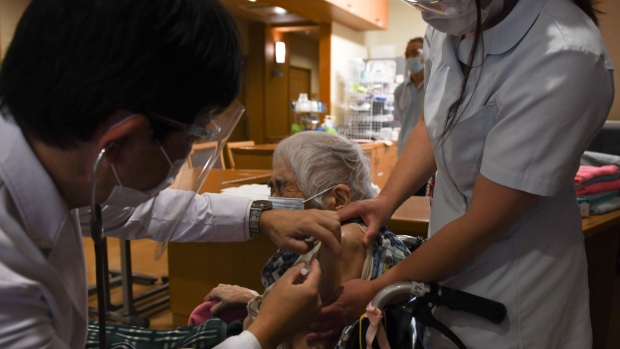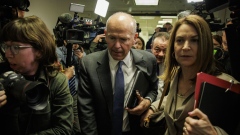Apr 16, 2021
Japan’s Latest Covid Wave Casts Another Cloud Over the Olympics
, Bloomberg News

(Bloomberg) -- A fourth wave of coronavirus infections in Japan is renewing concerns about whether the Tokyo Olympics can, or should, kick off in fewer than 100 days.
A more contagious variant of the pathogen that shut down most of the world for the past year is spreading widely now in several parts of the country. Daily infections are hitting records in regions including Osaka, with signs that Tokyo is following in its path.
The government plans to reimpose restrictions on areas around Tokyo in an attempt to contain the latest surge, officials said Friday. Shigeru Omi, the head of a panel of experts advising the government, said the country has entered the fourth wave, according to Kyodo News.
Japan’s worsening outlook and its slow pace of vaccinations has prompted questions from the public, medical experts and the media about the feasibility of holding one of the world’s biggest international sporting event in July.
Japan began vaccinating people aged 65 and older on Monday, the first shots for members of the public after earlier priority was given to inoculating frontline medical staff. Japan’s vaccine chief said last month that the rate of Covid-19 inoculations wasn’t likely to gain speed until May -- with the percentage of its population receiving at least one dose lagging behind some places in Asia including Singapore and Hong Kong.
“Plans to hold the Olympic and Paralympic games this summer must be reconsidered as a matter of urgency,” according to an editorial in The BMJ, a medical journal published by the British Medical Association. “The world is still in the middle of a pandemic. SARS-CoV-2 variants are an international concern, causing a resurgence of Covid-19 globally.”
Health care workers and high-risk residents won’t have been vaccinated before the Olympics, to say nothing of the general population, according to the editorial, including senior author Kenji Shibuya, director of the Institute of Population Health at King’s College London and an outspoken critic of Japan’s coronavirus response.
Cancellation Possible
A senior official in Japan’s ruling party acknowledged the possibility that the Olympics could be canceled if it was determined that they couldn’t be held safely.
“What would be the point of an Olympics that spread the infection?” asked Toshihiro Nikai, secretary general of the Liberal Democratic Party, in an interview with TV broadcaster TBS released Thursday. Prime Minister Yoshihide Suga and the International Olympic Committee later reiterated that they’re committed to holding the Games.
The number of new cases reported each day nationwide climbed to more than 4,500 on Thursday, after falling to fewer than 1,000 a day in March. Tokyo posted a 34% jump in just a week, prompting governor Yuriko Koike to warn she would consider asking the central government to declare another state of emergency if the current control measures failed to slow the spread of infections.
Worrisome Variants
The proportion of cases that are of “variants of concern” have been rising in Tokyo, according to a health ministry Covid-19 advisory board. The variant that first emerged in the U.K. is particularly prevalent in Osaka, accounting for 74% of infections analyzed in the country’s second-largest city the week ending April 3. It is rapidly replacing other strains in other locations including Tokyo, according to an update from Japan’s National Institute of Infectious Diseases.
The worsening outlook in Japan more than a year after the virus emerged and following the introduction of vaccines to protect against infection has already led medical experts to weigh in on the safety of holding the Olympics this year.
Hiroshi Nishiura, an expert in mathematical modeling of infectious diseases at Kyoto University, told local magazine Shukan Bunshun that organizers should consider postponing the Games by another year if most citizens won’t be vaccinated until then. He later apologized, saying he made the comments in the hope people would discuss postponement as one option, and that athletes’ views were also important.
Public opinion remains firmly against holding the Games, though the opposition is softening a bit. Just 27% of respondents in a March 20-21 poll by the Asahi newspaper said they should take place this summer, up from 11% who felt that way in the winter.
©2021 Bloomberg L.P.






















